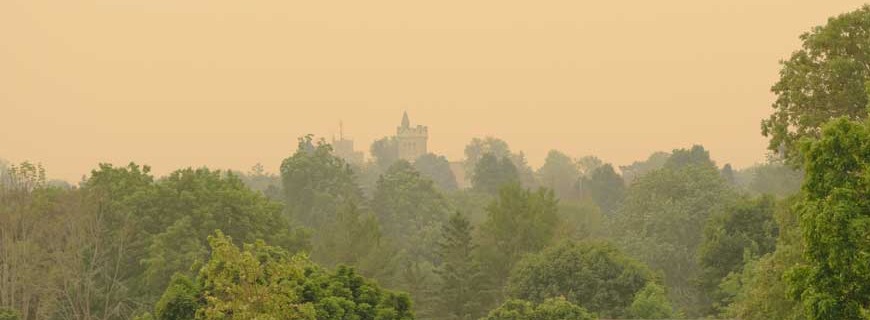Special air quality statement for the KFL&A area due to wildfire smoke

Kingston — Environment Canada has issued a special air quality statement for the KFL&A area. High levels of air pollution will develop tonight due to smoke from forest fires over northeastern Ontario and Quebec, resulting in deteriorated air quality. Conditions may improve for some areas Friday. Air quality and visibility can fluctuate over short distances and can vary from hour to hour due to the wildfire smoke.
Wildfire smoke can be harmful to everyone’s health even at low concentrations.
People with lung disease (like asthma or heart disease), older adults, children, pregnant people, and people who work outdoors are at higher risk of experiencing health effects caused by wildfire smoke.
Milder and more common symptoms of smoke exposure include:
- sore and watery eyes
- runny nose and sinus irritation
- scratchy throat and mild coughing
- headache
Severe symptoms:
- shortness of breath
- wheezing (including asthma attacks)
- severe cough
- dizziness
- chest pains
- heart palpitations
Stop or reduce your activity level if breathing becomes uncomfortable or you or someone in your care feel unwell. Please contact your health care provider if you develop severe symptoms.
Be sure to check on people in your care and those around you who may be more susceptible to smoke.
Check the Air Quality Health Index (AQHI) and monitor your symptoms. People respond differently to smoke. Mild irritation and discomfort are common, and usually disappear when the smoke clears. Drinking lots of water can help your body cope with the smoke.
If you have an HVAC system in your home, use the highest rated MERV filter for your system (ideally rated 13 or higher) and set the fan to recirculate air constantly. You can also use a portable High Efficiency Particulate Air (HEPA) air cleaner. Keep your doors and windows closed if the temperature in your home is comfortable. You can also take a break from the smoke at a local clean air location.
Reduce sources of indoor air pollution. If you can, avoid smoking or vaping indoors, burning incense and candles, frying foods, using wood stoves and vacuuming. Dust on indoor surfaces can be removed by wiping and wet mopping during a pollution episode.
If you must spend time outdoors, a well-fitted respirator type mask (such as a NIOSH certified N95 or equivalent respirator) that does not allow air to pass through small openings between the mask and face, can help reduce your exposure to the fine particles in smoke.
Please continue to monitor alerts and forecasts issued by Environment Canada website. For the latest status and details on all alerts, visit the Government of Canada’s website.
—30—










